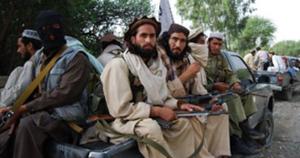TerrorismIn Pakistan, stronger support for militant groups among the middle class than the poor
Expectations that poorer people are more susceptible to the appeals of violent groups have contributed to U.S. policies that focus on using aid to reduce poverty as a way to combat militant violence; a new survey found, however, that the poor in Pakistan were substantially more negative toward militant groups than their middle class countrymen

Taliban fighters at their base in northern Waziristan // Source: presstv.ir
A groundbreaking survey of Pakistanis has found stronger support for militant groups among the middle class than the poor. The finding by a team including Princeton researchers challenges the conventional wisdom about links between economic status and views on militants that has helped shaped American foreign-aid policies since 2001.
The nationally representative survey of 6,000 Pakistani adults, conducted in the spring of 2009, also found that Pakistanis in general held militant groups in low regard. When the survey results were analyzed along with data that identified the sites of violent attacks, researchers saw evidence that support for the militant groups was reduced by residents’ direct exposure to militants’ violent actions.
A Princeton University release reports that the survey and its potential implications for the way American foreign aid is distributed are described in an article published online in July by the American Journal of Political Science. The authors are Princeton graduate student Graeme Blair; C. Christine Fair, assistant professor, Center for Peace and Security Studies at Georgetown University; Neil Malhotra, associate professor, Graduate School of Business at Stanford University; and Jacob Shapiro, assistant professor of politics and international affairs in Princeton’s Woodrow Wilson School of Public and International Affairs.
Expectations that poorer people are more susceptible to the appeals of violent groups have contributed to U.S. policies that focus on using aid to reduce poverty as a way to combat militant violence. The survey found, however, that the poor in Pakistan were substantially more negative toward militant groups than their middle class countrymen. By one measure, poor Pakistanis were up to 23 times more negative about militants than their middle-class counterparts.
“Giving development aid may be effective in improving peoples’ livelihoods and making them better off in monetary ways, but it is not going to be effective in changing their minds because the poor in Pakistan are not the people whose minds we need to change,” said Blair, a fourth-year Ph.D. student in the Department of Politics. “They already really dislike the militant groups.”
David Laitin, the James T. Watkins IV and Elise V. Watkins Professor of Political Science at Stanford who was not involved with the research, said it represents an advance in scholarship on the topic.
“This paper takes one more careful step toward understanding the relationship of poverty and terror, much of it moved forward by Princeton scholars. Alan Krueger, now chairman of the [White House Council of Economic
